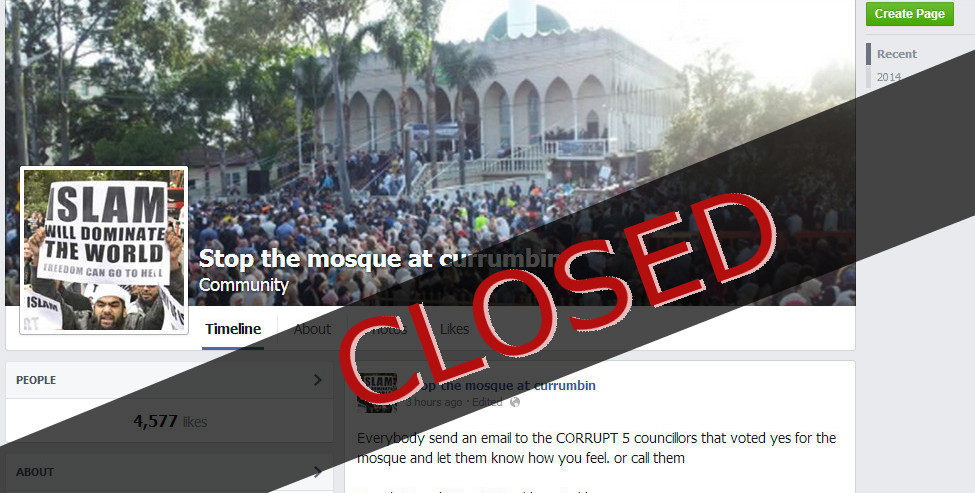 The Online Hate Prevention Institute, Australia’s only charity dedicated to hate speech in social media, is pleased to see that Facebook has finally closed the Facebook page “Stop the Mosque at Currumbin” (ID# 412242425582044 ). The page not only incited hate against the Muslim community, but also sought to intimidate and target members of the local council who had to consider the planning proposal for a Mosque in Currumbin. In one case a Gold Coast Councillor was threatened with gang-rape and death through the Facebook page.
The Online Hate Prevention Institute, Australia’s only charity dedicated to hate speech in social media, is pleased to see that Facebook has finally closed the Facebook page “Stop the Mosque at Currumbin” (ID# 412242425582044 ). The page not only incited hate against the Muslim community, but also sought to intimidate and target members of the local council who had to consider the planning proposal for a Mosque in Currumbin. In one case a Gold Coast Councillor was threatened with gang-rape and death through the Facebook page.
The Commonwealth needs to seriously consider the application of S474.17 of the Commonwealth Criminal Code, a provisions relating to “using a carriage service to menace, harass or cause offence”, to this situation. An example needs to be made of those who seek to intimidate elected representatives through social media.
Facebook needs to improve its response in relation to pages stirring up bigotry and intimidate people, including the intimidation of elected representatives. This incident is not isolated by follows the problem with another Facebook page opposing the Bendigo Mosque. Further situations like this are likely unless Facebook takes a stronger stance against organised efforts to vilify Muslims each time there is a new planning application for a Mosque. The Facebook platform is playing a role in facilitating bigotry across borders and undermining democracy.
This is a problem that must be addressed by both Facebook and by Government. We offer OHPI’s assistance and expertise to both Facebook and State and Commonwealth Governments in tackling this challenge. Further details of both the anti-Muslim element of this page, and the intimidation of councillors, follow.
Anti-Muslim Hate 2.0
The “Stop the Mosque at Currumbin page used classic “hate 2.0” as described in OHPI’s report into anti-Muslim Hate released last December. As we explained then:
“Hate 2.0 involves the use of content that constitutes hate speech in combination with a social media platform that is able to take that content viral. The aim is not only to spread the hateful content, but to also normalise it. When the hate speech becomes no more than another opinion, the hate itself can be openly expressed not only online, but also in daily life. This creates problems of intimidation, exclusion, and ultimately violence resulting from incitement.”
The report also noted how:
“forums promoting hate 2.0 readily combined statements denying they spread hate with statements that actually did spread hate… This is part of the normalisation effort aimed at making hate against the target group appear acceptable. We’re against hate, it says, but this sort of hate doesn’t count. This normalisation is similar to dehumanisation where the victim group is declared less human and as a result the denial of their right, and ultimately the call for violence against them, is made to appear more reasonable or at least more palatable.”
On the “Stop the Mosque at Currumbin” page we can see the classical hate 2.0 in a post that starts:
“There are a few idiots out there that think we are spreading hate. All we are doing is reposting the stories that are on the news…” The same post goes on to declare, “Multiculturalism was fine until islam reared its ugly head and ruined it for everyone… [it] is so different to our culture they spend all their time complaining about a pork and bacon and how their feelings are hurt. Now western societies have had enough. If they don’t like our way then there are over 50 islamic countries they could have gone too.”
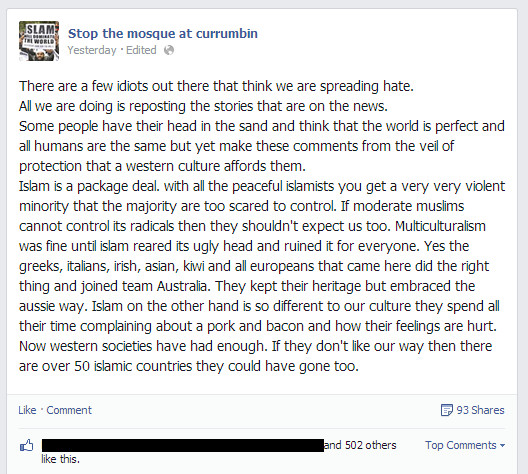
Some examples of bigotry in this post include:
- Claiming Muslims are collectively responsible for the actions of other Muslims
- Creating a “them” (Muslims) and “us” (later referred to as “team Australia”)
- Claiming Muslims are different from other sections of society and can never be “fit in”
- Conflating all Muslims, including for example those born in Australia, with asylum seekers
More explicit hate speech was also present on the page. One of the news posts the page mentioned, for example, shares a story (not from Australia), about terrorist recruitment focusing on Mosques as online security tightens. On this basis the page declares “Where do you think the terrorist recruiters spread their words of hate. = Mosques”. The post goes a step further saying this is “another reason why we don’t need a Mosque”. The post is not simply sharing a news article, it is spreading fear of all Muslims, stereotyping them as terrorists, and generalising the idea that all Mosques are bases for terrorist recruitment. Such posts, and commentary, are clearly doing more that “reposting the stories that are on the news”. Post like constitute vilification and incitement.
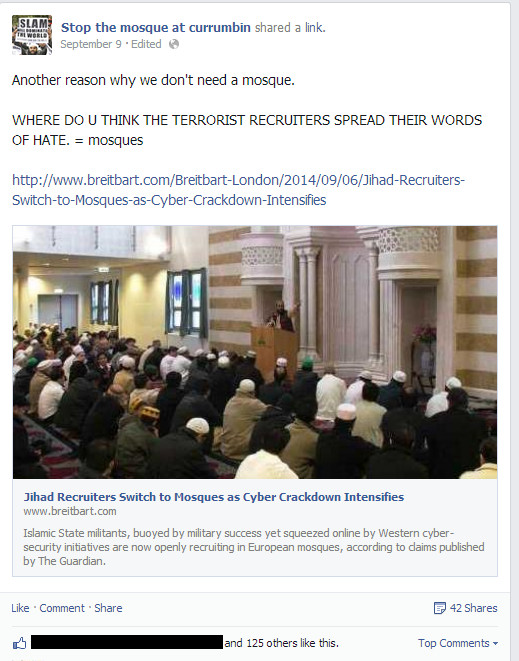
Libel, vilification and intimidation of the Councillors
On top of the bigotry already discussed there is the matter of libel, vilification and intimidation of the local councillors. There are two conflicting right here. The first is the councillors right to their reputation and to be free of intimidation – the same right all Australian’s enjoy. The second is the right of Australian citizens (collectively) to discuss and be informed about the actions of government, including local council. This second right is part of the constitutionally implied Freedom of Political Communication. Freedom of Political Communication is not an individual right, but is rather a block on the power of governments to make laws which would undermine the public’s ability to effectively choose subsequent governments.
Freedom of Political Communication is also not absolute, a law will only be invalid if it fails the two part Lange test. The test first asks whether the law actually does restrict freedom of communication about government or political matters, and if so, it then asks whether the law is ‘reasonably appropriate and adapted’ to achieve ‘a legitimate end in a way that is compatible’ with Australian democracy. If it is, the law will not be found to be invalid. Laws like S18C of the Racial Discrimination Act, which make racist speech unlawful, have been found to be valid because they pursue a legitimate objective and enhance, rather than restrict, the ability for all Australians to participate in the democratic process.
Discussion about the Mosque would be ok. Discussion about the voting pattern of elected Councillors would be ok. Using the picture of Councillor Chris Robbins as the pages profile picture, targeting her, and claiming she was “receiving money from unspecified Islamic backers” (which she denies), would likely cross into libel. Taking thing a step further, the Councillor was also threatened with gang-rape and death. The Brisbane Times has report how threats of violence targeting the councillor were made both by the page itself and in comments left by users. After the article highlighting Facebook’s lack of cooperation was published, Facebook finally closed the page.
Before its closure, other councillors were also targeted by the page. They were called “corrupt” and “traitors”, and this too may move into the territory of libel. Encouraging people to contact the Councillors on mass in the context of calling the councillors corrupt and traitors may amount to intimidation. It certainly undermines the democratic process.
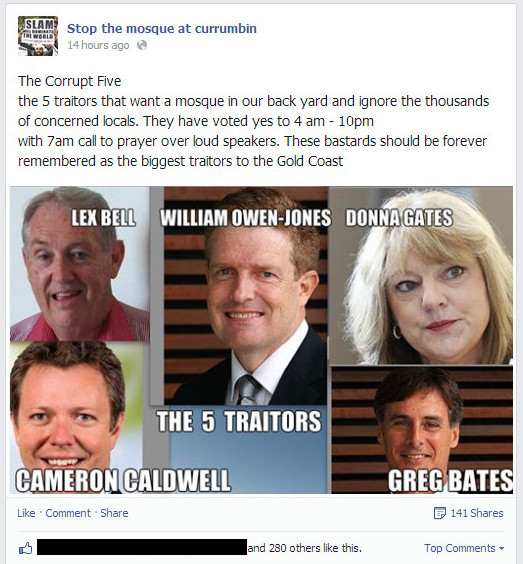
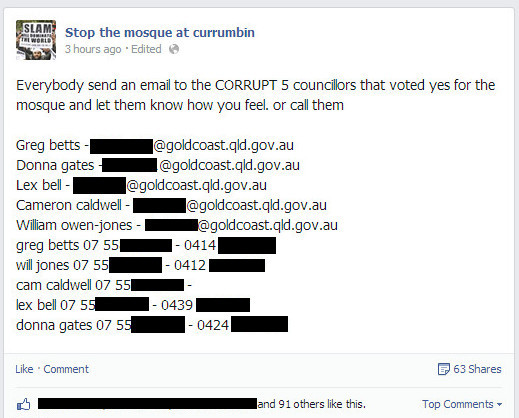
As a matter of policy Facebook does not allow us to advertise posts that are critical of Facebook, so the only way people will see this briefing is if you let them know about it. Please take a moment to return to the top of the page and share this briefing on Facebook or Twitter.
UPDATE 16 Septmeber 2014: Following the publication of this briefing, OHPI’s CEO, Dr Andre Oboler, was interviewed by ABC Radio Brisbane. Listen to the Interview here.
